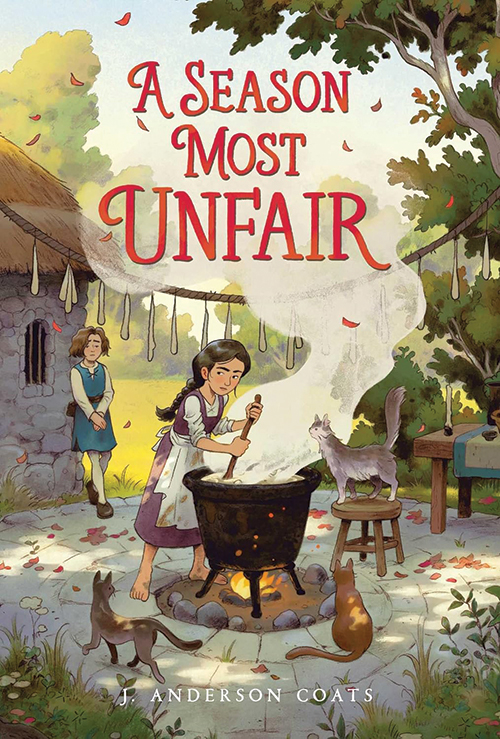
A Season Most Unfair
Reviewed by Sarah Hendess
May 1, 2024
By J. Anderson Coats. Atheneum Books for Young Readers, 2023. 288 pages. $17.99/hardcover; $8.99/paperback (available in June); $10.99/eBook. Recommended for ages 10 and up.
Scholastica, aka “Tick,” loves working with her father as they make candles at their home outside Cambridge, England, sometime in the Middle Ages. Sure, working with tallow makes her smell terrible (so much so that her former friends now avoid her), but the local stray cats keep her company, and she’s not interested in helping her friends chase after their younger siblings anyway. Even if she were, missing out would be a small price to pay to accompany Papa to the Stourbridge Fair each year to sell their candles.
This year, Papa needs Tick more than ever. With his eyesight quickly fading, he can no longer do the more detailed parts of making candles, and he certainly can’t press and paint the delicate Agnus Dei charms that bring in a good portion of their annual income at the fair. Tick is proud to be more vital to the family business than ever when disaster strikes. Papa hires an apprentice, a boy named Henry.
Suddenly, Tick finds herself pushed into the house to help her stepmother with domestic work while Papa trains Henry in candlemaking. But with Papa’s poor eyesight, he can’t see how lopsided Henry’s candles are, nor can he see how badly Henry paints the Agnus Dei charms. Tick is furious that she’s been replaced, devastated by Papa’s new coolness toward her, and terrified that Henry’s amateur work will doom her family to a winter of hunger. Her only consolation is that she’ll still get to go to the fair with Papa.
But then Papa announces that Tick will be staying home while he and Henry go to the fair, and the last shred of Tick’s hope comes crashing down. Angrier than ever and worried about her family’s finances, she hatches a plan to make her own Agnus Dei charms and sneak away to the fair to sell them. She hopes that when she hands Papa a pile of silver, he’ll finally admit how much he needs her.
While there are no direct Quaker references in the book (as the setting predates Quakerism by several centuries), there are multiple themes that will resonate with Friends, particularly the importance of truthfulness. Papa isn’t entirely truthful about why he brings Henry onboard, nor does he reveal his failing eyesight to Henry until the very end of the book. Tick “borrows” a brick of beeswax from a neighbor without his knowledge, intending to repay him from her proceeds from the fair. Finally, when Tick is recognized by others at the fair, it leads to accusations that her father is breaking the fair’s rules by selling the same product in two locations. Throughout, it’s clear to readers that these falsehoods and omissions only cause problems rather than solve them.
While Tick’s near-constant kvetching about being replaced grows tiresome, it’s unlikely to spoil the ride for younger readers. Middle-grade readers will be delighted.
Sarah Hendess attends Winter Park (Fla.) Meeting. She is a current reviewer and former children’s book review editor for the Historical Novels Review.



Comments on Friendsjournal.org may be used in the Forum of the print magazine and may be edited for length and clarity.